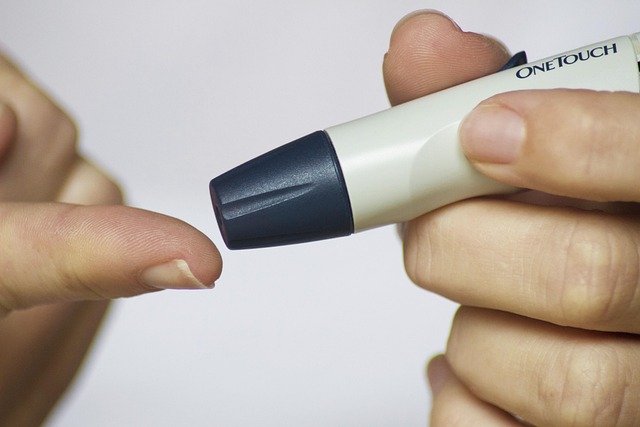The UK has embraced online blood testing for diabetes management, driven by tech advancements and changing healthcare needs. This convenient method allows patients to monitor glucose levels at home using a few drops of blood and an online platform. Benefits include improved accessibility, reduced costs, and better health outcomes, especially for rural or mobile-limited patients. However, challenges like privacy concerns, adherence, device functionality, and digital literacy barriers exist. Future diabetes care in the UK aims for a digital revolution with advanced tools like continuous glucose monitoring (CGM) for efficient patient management, emphasizing patient safety, data security, and accurate result interpretation.
In the digital age, diabetes management is undergoing a transformative shift with the advent of online blood tests and remote monitoring. The UK is witnessing a rise in these innovative approaches, offering patients greater convenience and accessibility. This article explores the growing trend of UK diabetes blood tests, delving into their benefits—such as improved patient engagement and early detection—and challenges, including regulatory concerns and data privacy issues. We also discuss future implications and best practices to ensure optimal online diabetes care.
- The Rise of Online Blood Testing for Diabetes Management in the UK
- Benefits and Challenges of Remote Monitoring for Diabetic Patients
- Future Implications and Best Practices for Online Blood Tests in Diabetes Care
The Rise of Online Blood Testing for Diabetes Management in the UK
In recent years, the UK has witnessed a significant shift towards online blood testing for diabetes management, driven by advancements in technology and changing healthcare demands. This innovative approach allows individuals with diabetes to conveniently monitor their blood glucose levels from the comfort of their homes. With just a few drops of blood and a simple online platform, patients can access real-time data, enabling them to make informed decisions about their health.
The rise of UK Diabetes Blood Test services has brought numerous benefits, including improved patient convenience, reduced healthcare costs, and better management outcomes. Online testing platforms offer easy-to-use interfaces, ensuring that individuals with diabetes, regardless of their tech proficiency, can navigate the system effectively. This accessibility is particularly advantageous for those in rural areas or with limited mobility, promoting consistent self-monitoring and contributing to better glycemic control.
Benefits and Challenges of Remote Monitoring for Diabetic Patients
Remote monitoring of blood glucose levels for diabetic patients in the UK offers numerous advantages, revolutionizing traditional care methods. This innovative approach enables individuals to access regular, convenient testing at home, eliminating the need for frequent clinic visits. With online platforms providing real-time data visualization and trend analysis, patients gain better control over their condition. This is particularly beneficial for those with busy lifestyles or limited mobility, ensuring they can manage their diabetes effectively while maintaining a sense of independence.
However, challenges exist in this digital health landscape. Privacy and security concerns are paramount, as sensitive medical information must be protected during online data transmission. Additionally, ensuring accurate results relies on patients’ adherence to testing protocols and the reliable functionality of monitoring devices. Limited access to technology or digital literacy issues could hinder some individuals from fully participating in remote diabetes management.
Future Implications and Best Practices for Online Blood Tests in Diabetes Care
The future of diabetes management in the UK looks set to be transformed by online blood tests and monitoring technologies, offering patients increased convenience and healthcare providers more efficient care delivery models. As technology advances, these tools could become increasingly sophisticated, enabling continuous glucose monitoring (CGM) through wearable devices that provide real-time data insights. This shift towards digital health solutions has the potential to improve patient outcomes and reduce the burden on healthcare services by promoting early detection of complications and facilitating better-informed treatment decisions.
Best practices for implementing online blood tests in diabetes care should focus on ensuring patient safety, data security, and accurate interpretation of results. Standardized protocols for remote testing, including clear guidance on sample collection and storage, are essential. Additionally, healthcare professionals must be adequately trained to interpret the data generated from these tests and effectively communicate any changes or concerns to patients, fostering a collaborative approach to diabetes management. Regular reviews and updates of guidelines will also be necessary to keep pace with technological advancements and address emerging challenges in this rapidly evolving landscape.
The integration of online blood testing and remote monitoring in diabetes management offers a promising, accessible approach for UK diabetic patients. By streamlining testing processes and providing real-time data, these innovations empower individuals to actively participate in their care. However, ensuring patient education, data privacy, and standardized protocols remains crucial for the successful adoption of this technology. As research progresses, online blood tests have the potential to revolutionize diabetes management, improving quality of life and outcomes for those living with this chronic condition in the UK and beyond.
